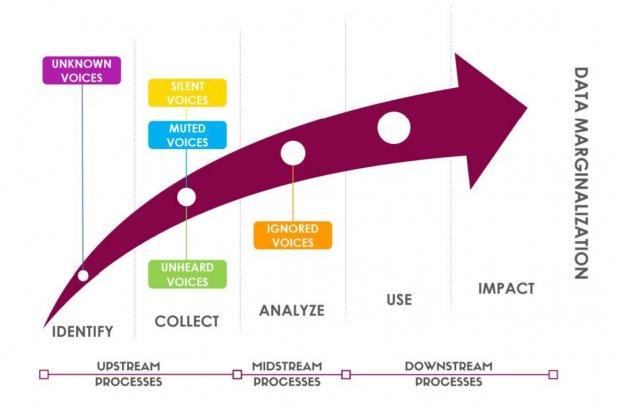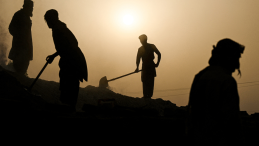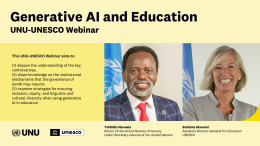
Data and statistics on COVID-19 are helping countries to understand the pandemic situation, to plan and make-decision, and to anticipate future pandemic dynamics. For most countries, data is driving strategies for dealing with the pandemic - having good data (from testing, contact tracing, symptom checking) is one of the key differences between countries that are succeeding in containing the coronavirus.
Despite the many benefits of data, the data processes and data-related outcomes on COVID-19 have shown the potential to marginalize and exclude specific individuals and population groups across the stages of the data value chain, from the data production to data use, i.e., the data identification, collection, analysis, dissemination, and use. In the current situation of the COVID-19 pandemic, marginalization and exclusion have severe ramifications, including loss of life.
Individuals and population groups who are marginalized in the data identification stage are usually those who are invisible in the mainstream societies, hence are not on the radar of COVID-19 data collecting actors – we call these the “unknown voices”. These include communities living in remote villages and people in precarious situations, such as fishermen working under slavery-like conditions. For those trapped in modern slavery, forced labour, and human trafficking, the risks of contracting and dying from COVID-19 while not getting detected are high considering their precarious living condition and the inability to effect containment measures such as social distancing. This invisibility in data translates to the inability to access essential services, including health care services, in the time of the COVID-19 pandemic.
There have also been numerous cases of people avoiding “getting counted” in COVID-19 data systems. Here, the self-concealment can be explained by several factors, including fear, lack of trust, and the effects of disinformation. Some people have raised concerns over the quality of health facilities and the risks of exposure as the motivation for self-concealment. Many people have also avoided using COVID-19 symptom tracking and contact tracing apps due to privacy and data justice concerns. In some countries, immigrants are increasingly afraid to seek testing or treatment for the coronavirus because they fear doing so could lead to deportation or being prevented from receiving permanent residency in the future. In further cases, people have believed the COVID-19 disinformation narratives (that COVID-19 is a hoax) and have avoided testing and heeding any measures put forth to contain the virus.
There are myriad of ways through which people could get further marginalized in the COVID-19 data collection phase. In some countries, among the transient population such as the homeless and the institutionalized groups, for example, those living in places of detention, there is lack of testing; hence data capturing the rates of infection in both settings are lacking. This is despite these people being among those most at risk of contracting COVID-19 and at risk of becoming epicentres of new outbreaks. Those who are silenced by socio-cultural norms, who we call the “muted voices”, such as the members of the LGBT+ people are also reluctant to get tested and seek medical care because of the distress of being unfairly stigmatized as spreading COVID-19 and being further discriminated against.
Marginalization in COVID-19 data is also attributable to limitations associated with the data collection processes and infrastructures, such as the poor quality of COVID-19 test kits. Faulty test kits which produce inaccurate results could potentially misrepresent individuals and population groups as immune to COVID-19, hence excluding them from the provision of treatments and mobility restrictions requirements.
Companies and governments worldwide are tapping the location data of millions of internet and mobile phone users for tracking symptoms, contact tracing, tracking the spread of COVID-19 and monitoring whether containment measures are working. These COVID-19 data initiatives use mobile location data collected from cellphone towers, the global positioning system (GPS), and Bluetooth. However, with almost half of the world’s population remaining offline, reliance on digital technologies in COVID-19 tracking can leave unconnected populations uncounted in the COVID-19 data – we call these populations, the “unheard voices”.
Besides marginalization that occurs during the COVID-19 data collection phase, several cases have also demonstrated how marginalization and exclusion can creep in during the data analysis phase, to the detriment of the “ignored voices”. For instance, the lack of disaggregated data and diversity-sensitive analysis needed to measure COVID-19’s impact on different gender, racial, and ethnic groups, as well as on people with disabilities makes it difficult to facilitate targeted policies. Such diversity-sensitive data analysis is important for devising more equitable COVID-19 responses. Further, the use of Artificial Intelligence solutions for informing COVID-19 decision and responses has been shown to have the potential to perpetuate biases, disparities and marginalization.
Finally, in the data use phase, marginalization concerns centre around the limit of COVID-19 data use, reuse, retention, and deletion. Given the urgency of the current pandemic, many of the current data initiatives have focused on the supply side of data. These initiatives focus on what data, including personal data, can be collected, and used without demand-side considerations of purpose limitation and data minimization. Contact-tracing apps have been criticized for potentially enabling government agencies to use collected data beyond COVID-19 response purposes and for a general lack of technical transparency and accountability. Further, in many countries, the needs of specific stakeholders, such as policymakers and public health professionals, have superseded and been elevated above the needs of the citizens, especially with regards to data justice concerns. COVID-19 data valorization has likewise primarily been targeted towards government stakeholders, including policymakers, with less attention paid to how the data can directly benefit the individual “public concerned” who the data is about.
With less than a decade to 2030, towards the achievement of the Sustainable Development Goals, the ongoing COVID-19 pandemic has been an excellent litmus test of the ability of countries and the global community to harness resources, including data and technology, towards addressing pressing global challenges. The pandemic is also highlighting the importance of considering data assemblages, beyond just the data, in employing data solutions towards addressing significant global challenges and achieving inclusive and sustainable global development. The upcoming UN World Data Forum, which brings together data and statistics experts from around the world, foregrounds the agenda of inclusion and participation (under the “Leaving no one behind” thematic area) and provides an opportunity for the global community to deliberate and formulate solutions that ensure visibility and give voice to the marginalized and excluded population groups.
This article was originally published on the UN World Data Forum Blog.
Suggested citation: Debora Christine , Mamello Thinyane., "Who is Being Left Behind in COVID-19 Data?," UNU Macau (blog), 2020-10-08, https://unu.edu/macau/blog-post/who-being-left-behind-covid-19-data.


